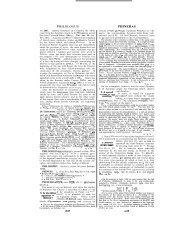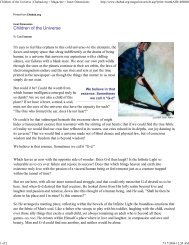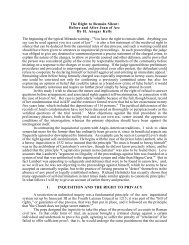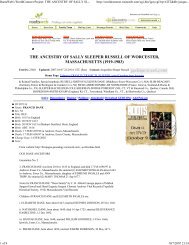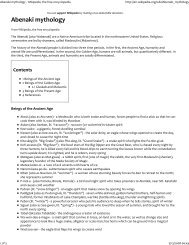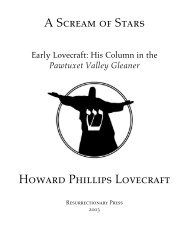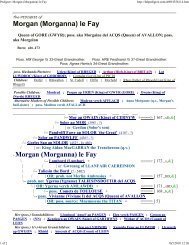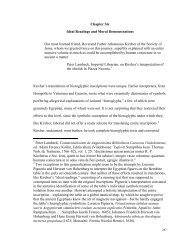Encylodaedia Biblica; a critical dictionary of the literary, political and ...
Encylodaedia Biblica; a critical dictionary of the literary, political and ...
Encylodaedia Biblica; a critical dictionary of the literary, political and ...
You also want an ePaper? Increase the reach of your titles
YUMPU automatically turns print PDFs into web optimized ePapers that Google loves.
ZILLAH<br />
5417<br />
* ZILPAH<br />
his vassal David (li S. 2f6f.; cp 301426 2 S. 11 410 from <strong>the</strong> Aramrean (Holzinger, KHC on Gen. 309 ;<br />
I Ch. 12 I 20). Ziklag also appears with o<strong>the</strong>r places in<br />
<strong>the</strong> far S. in Neh. 1128. In Josh. 1531 (P) it is enumerated<br />
among <strong>the</strong> more remote towns <strong>of</strong> Judah, but in<br />
Josh, 195 (P) is assigned to Sinieon. Conder's identification<br />
<strong>of</strong> Ziklag with Zuheilika a site 11 in. E. by S.<br />
<strong>of</strong> Gaza, <strong>and</strong> 19 m. SW. from Beit-Jibrin or Eleu<strong>the</strong>ropolis<br />
(PEPQ, 1878, pp. I Z ~ ) has , been generally but<br />
too hastily accepted.<br />
The name is certainly corrupt, hut not so far as entirely to<br />
obscure <strong>the</strong> true name. The two names identified by Condet<br />
begin with'a different sibilant, <strong>and</strong> zuheilika reminds us <strong>of</strong> AI.<br />
zahaliku declivities,' a name which ippiies well to <strong>the</strong> three<br />
small hilis, nearly a mile apart, on which (see Conder) <strong>the</strong> ruins<br />
called Zuheilika st<strong>and</strong>. Ziklag is as corrupt as Ahishag or <strong>the</strong><br />
jhplc (see SACK) <strong>of</strong> 2 R. 442. It is best to read 7$bJ or a&?<br />
(cp Ass. gak, 'fortress'), an ancient <strong>and</strong> famous city (see<br />
BEKED), repre4ented by <strong>the</strong> mod. Halqa, in <strong>the</strong> W3dy Asliij<br />
about 12 m. S. <strong>of</strong> Beersheha, on th: way to Ruheiheh or Rehot<br />
both (see map <strong>of</strong> NEGEB, A 2, after col. 3376). In Josh. 19 j6<br />
Ziklag is grouped with Beth-marcahoth which should be read<br />
Beth-rehoboth (see MARCABOTH). This fits in perfectly with<br />
<strong>the</strong> story <strong>of</strong> David's raids while at Ziklag. The name Haliisah<br />
or Halagah is also not impossibly concealed under Jekabzeel or<br />
KABLEEL (q.~.) ; <strong>the</strong> lists <strong>of</strong> P <strong>and</strong> <strong>of</strong> <strong>the</strong> Chronicler <strong>of</strong>ten contain<br />
corrupt variants <strong>of</strong> <strong>the</strong> same name, given as names <strong>of</strong> distinct<br />
places or persons. This accords with <strong>the</strong> view that 2 S.<br />
21 15-22 23 8-23 relates to a war <strong>of</strong> David with <strong>the</strong> Rehobothites<br />
<strong>and</strong> <strong>the</strong> Znrephathites (seeRE~osoTH, ZAREPHATH); <strong>the</strong> original<br />
text was misunderstood <strong>and</strong> wrongly edited. Very possibly <strong>the</strong><br />
'hold ' (il!?Xp to which David ' fled' (read for l:! in 2 S.<br />
6 17) <strong>and</strong> where he was when he longed for water 'from <strong>the</strong><br />
cistern <strong>of</strong> Bethlehem--.e., probably a 'Bethlehem' in <strong>the</strong><br />
Ne eb was that <strong>of</strong> Haliiah, which was not far from <strong>the</strong>valley<br />
<strong>of</strong> 4aar;hath (text, ' Rephaim'), where <strong>the</strong> Zarephathites (text,<br />
Pelktim) were arrayed against him. Haliisnh may likewise be<br />
<strong>the</strong> original <strong>of</strong> HAZZ&LEL[PONI] in I Ch. 43 (unless Hazzelel<br />
presup oses Halas'el ; see BBZALEEL), <strong>of</strong> Ahuzzath in Gen. 26 26<br />
<strong>and</strong> (<strong>of</strong>course) <strong>of</strong> Chellus in Judith 19. Possibly Haliivh wa;<br />
originally <strong>the</strong> centre <strong>of</strong> <strong>the</strong> cult <strong>of</strong> <strong>the</strong> hero ISAAC (q.~., 5 I).<br />
The above view was formed long before <strong>the</strong> appearance <strong>of</strong><br />
Winckler's Gesch. 2, where (185) it is held that Ziklag is <strong>the</strong><br />
capital <strong>of</strong> <strong>the</strong> Krethi or Cherethites ; cp I S. 30 14.<br />
Perhaps ' Ziklaggim' (or Halusathini) may underlie <strong>the</strong> difficult<br />
' Casluhim' in Gen. 10 14. See MIZRAIM, col. 3164, n. I.<br />
'r. K. c.<br />
. ZILLAH ( 7 5 ' Y; , sshAa [AEL] ; .s.xLa),Gen. 4 19-23?.<br />
See CAINITES, 5 9.<br />
Baethgen, Beeitr. 160).<br />
In Aram. 2/ zrp means ' to drip, trickle,'l in Syriac ' to defile';<br />
in Assyrian, where, however, <strong>the</strong>re is <strong>the</strong> natural uncertainty as<br />
to whe<strong>the</strong>r <strong>the</strong> first radical is z or s it occurs as zu-hp&-e.g.,<br />
in <strong>the</strong> recurring phrase [du-6i-i6] zb'-iig.fi, ' [planningj hostility.'<br />
If <strong>the</strong> <strong>the</strong>ory <strong>of</strong> Arainaean extraction was a modification<br />
<strong>of</strong> an older story (cp below), <strong>the</strong> name may have<br />
been earlier Dilpah (cp Jidlaph, <strong>the</strong> ' uncle ' <strong>of</strong> Iiebekah;<br />
Gen. 2222), <strong>the</strong> root <strong>of</strong> which does occur in Hebrew.<br />
On <strong>the</strong> assumption that <strong>the</strong> name has been modified,<br />
C. Niebuhr (Gesch. 1253) connected it with Zelophehad<br />
(mpk ; for a suggestion as to <strong>the</strong> real origin <strong>of</strong> which<br />
strange name, however, see MANASSEH, 5 94, whilst<br />
Cheyne formerly connected both Zilpah <strong>and</strong> Zelophehad<br />
with ' Salhad' (above, col. 2309 near foot). This<br />
suggestion he regards as still tenable ; hut his present<br />
view is different.2<br />
It has always seemed strange that such widely<br />
separated communities as Gad <strong>and</strong> Asher should be<br />
a. zilpah grouped as Zilpah tribes. Their agreement<br />
in bearing names <strong>of</strong> deities apparently distribes.<br />
tinct from Yahwe has been noted elsewhere<br />
(ASHER, 5 I n. ; GAD, 5 z), as also <strong>the</strong>ir Aramrean<br />
elements (ASHER, 5 3, GAD, 5 2). Whe<strong>the</strong>r <strong>the</strong>y once<br />
lived toge<strong>the</strong>r is uncertain. It has been thought that<br />
traces <strong>of</strong> an early stay <strong>of</strong> Asher can be detected S. <strong>of</strong> <strong>the</strong><br />
plain <strong>of</strong> Megiddo (cp ASHER, 5s I 3). The presence <strong>of</strong><br />
Beria <strong>and</strong> <strong>of</strong> Heber <strong>and</strong> Malchiel as fa<strong>the</strong>r <strong>and</strong> sons in<br />
<strong>the</strong> Asher list (Nu. 2644fl) <strong>and</strong> <strong>the</strong> same three names<br />
(if Michael is for Malchiel) in nearly <strong>the</strong> same relation<br />
in Benjamin lists (I Ch. 813 8 163) <strong>and</strong> <strong>of</strong> a clan<br />
Beria in an Lphraim list would be a not unnatural<br />
result if Ephraim <strong>and</strong> Benjamin's territory had been<br />
earlier occupied by Asherites (so Steuernagel, Binw<strong>and</strong>.<br />
30J). If <strong>the</strong> sons <strong>of</strong> Zilpah are meant in Genesis to<br />
be regarded as older than Joseph <strong>the</strong> seniority would be<br />
a natural way <strong>of</strong> reprzsenting an earlier occupation <strong>of</strong><br />
<strong>the</strong> Ephraim highl<strong>and</strong>s which must be assumed if we<br />
suppose that Asher really entered Palestine from <strong>the</strong> E.<br />
We might suppose that a Zilpah tribe was settled in E.<br />
Palestine, that part <strong>of</strong> it crossed <strong>the</strong> Jordan, <strong>and</strong> after<br />
staying a while in Ephraim moved northwards <strong>and</strong><br />
ZILPAH (?I@)!, zsA@a [ADEL]), <strong>the</strong> mo<strong>the</strong>r <strong>of</strong> <strong>the</strong><br />
tribes GAD <strong>and</strong> ASHER (Gen. 3010-13, J ; 3526 P) ; also<br />
took <strong>the</strong> name <strong>of</strong> Asher (from <strong>the</strong> older inhabitants in<br />
<strong>the</strong> N. ? see ASHER. 5s I 3), whilst <strong>the</strong> portion <strong>of</strong> <strong>the</strong><br />
represented as <strong>the</strong> maid <strong>of</strong> Leah (2924<br />
1. Name.<br />
3526 P) <strong>and</strong> <strong>the</strong> concubine <strong>of</strong> Jacob<br />
(309 J; 372 46-9 P). If any explanations <strong>of</strong> <strong>the</strong> name<br />
Zilpah tribe which remained came to be known as Gad.<br />
On <strong>the</strong> o<strong>the</strong>r h<strong>and</strong> it is uncertain when we are meant to<br />
place <strong>the</strong> birth <strong>of</strong> <strong>the</strong> sons <strong>of</strong> Zilpah. Even <strong>the</strong> editor<br />
Zilpah were ciirrent in early Israel, <strong>the</strong> editors <strong>of</strong> <strong>the</strong> need not have intended to suggest that both Gad <strong>and</strong><br />
Genesis narratives have not preserved <strong>the</strong>m. It is<br />
hardly possible, as it perhaps is in <strong>the</strong> case <strong>of</strong> Bilhah<br />
{see SBOT on Gen. 303), to guess what <strong>the</strong>y might<br />
Asher fall between Naphtali <strong>and</strong> Issachar <strong>and</strong> between<br />
Naphtali <strong>and</strong> Joseph (cp RACHEL, 5 IC). The sons'<br />
births may have been grouped artificially to facilitate<br />
have said.' The nearest approach to a narrative<br />
bearing on Zilpah is Gen. 372. That verse seems to<br />
represent a version <strong>of</strong> <strong>the</strong> Joseph-story in which <strong>the</strong><br />
enmity against Joseph was confined to <strong>the</strong> sons <strong>of</strong> Bilhah<br />
<strong>and</strong> Zilpah.2 Such a story may he a late invention to<br />
remove <strong>the</strong> reproach from <strong>the</strong> sons <strong>of</strong> Leah (Gunkel,<br />
ad ZQC.), in particular from Judah; hut P may have<br />
found it in sources which had more to say on <strong>the</strong><br />
subject. The name Zilpah cannot he explained from<br />
<strong>the</strong> vocabulary <strong>of</strong> <strong>the</strong> remains <strong>of</strong> Hebrew literature.<br />
We cannot be sure, however, that Genesis as we now<br />
read it regards Zilpah as Hebrew. Her mistress is a<br />
,daughter <strong>of</strong> Laban (cp RACHEL, 9 ~b).<br />
According to Test. XfI. Patr. Naph. I indeed Zilpah <strong>and</strong><br />
Bilhah, who are sisters (cp Juhiiees 289)'are dakghters <strong>of</strong> a<br />
maid (rar8ivrrq) <strong>of</strong> Laban (ALY~) <strong>and</strong> <strong>of</strong> So<strong>the</strong>os '<strong>of</strong> <strong>the</strong> stock<br />
<strong>of</strong> Abraham,' who wa5 carried captive from a place called Zelpha<br />
,(whence <strong>the</strong> name <strong>of</strong> his first-born). Elsewhere however <strong>the</strong><br />
sisters are daughters cf Laban himself by a concdhine (Ps.-\on.<br />
on Gen. 29 24 29 Gen. radba 74, Pir& Rub. El. 36 ; cp Charles,<br />
Bk. <strong>of</strong>/ub. 170g<br />
The name Zilpah has accordingly been explained<br />
1 For a late example see Tcsf. XfZ. Pah-., Naph. I, quoted<br />
below.<br />
2 It is against <strong>the</strong> sons <strong>of</strong> Bilhah <strong>and</strong> Zilpah that Joseph<br />
speaks to Jacob in Td. XZf. Patr., Gad, I.<br />
<strong>the</strong> narrative (cp TRIBES, 59f.). Steuernagel, indeed,<br />
pleads strongly -. for <strong>the</strong> historical trustworthiness <strong>of</strong> <strong>the</strong><br />
1 In Arabic 'to draw near ' hut ziIfa garden: in Ethio ic<br />
zelfat=repro<strong>of</strong>. YJkiit give; a water on <strong>the</strong> way to Mekta,<br />
Zuuljbtu. ii. 939 roJ (cp ii. 955 193).<br />
2 [When Steuernagel (Eimu<strong>and</strong>. 47) concludes that <strong>the</strong> clans<br />
derived from Zilpah, like those derived from Bilhah, were reyded<br />
as not so fully Israelitish as <strong>the</strong> Leah <strong>and</strong> Rachel tribes<br />
ecause <strong>the</strong>y were <strong>of</strong> hea<strong>the</strong>n origin, he does not allow for <strong>the</strong><br />
possibility that Leah <strong>and</strong> her maid Zilpah are only doubles <strong>of</strong><br />
Rachel <strong>and</strong> her maid Bilhah-or, etymologically, that Leah<br />
Rachel. <strong>and</strong> Rilhah are all corrunt frarments <strong>of</strong> lprahrneei<br />
(JACOB; B 3), <strong>and</strong> that Zilpah (with'whic~MrI-Hog~co~pares<br />
Jidlaph, most appropriately from <strong>the</strong> present point <strong>of</strong> view, for<br />
among his hro<strong>the</strong>rsare Kemuel=Jerahmeel, <strong>and</strong> Chesed=Cush)<br />
is an equally corrupt fragment <strong>of</strong> a name virtually synonymous<br />
with Jerahmeel-viz., Ishmael. Nor can <strong>the</strong> qossihilit): he<br />
$ied that 'Asher' may be connected with Asshur or<br />
Ashhur,' one <strong>of</strong> <strong>the</strong> ethnic names <strong>of</strong> <strong>the</strong> Negeh, <strong>and</strong> Dan with<br />
Adan or Adon-ano<strong>the</strong>r <strong>of</strong> <strong>the</strong>se names (cp PARADISE 4 7 end<br />
<strong>and</strong> see Crit. 6i6.). And only a very close examinat& df th;<br />
texts can assure us that Gad <strong>and</strong> Asher were not originally<br />
located in <strong>the</strong> Negeb. That <strong>the</strong> tradition made some <strong>of</strong> <strong>the</strong><br />
clans which were fused with <strong>the</strong> Jacob or Israel tribe hea<strong>the</strong>nish<br />
(;.e., worshippers <strong>of</strong> gods o<strong>the</strong>r than Yahwe), will, however, he<br />
universally admitted. The most important passages for <strong>the</strong><br />
textual critic are perhaps Gen. 29 I (on which.see JACOB, 5 3)<br />
<strong>and</strong> 31238 463 (on which see GALEED, GILEAD, but note<br />
that <strong>the</strong>re seems to have been a sou<strong>the</strong>rn Gilead, referred to<br />
eg., in Jer. 8 22 [see Cd. Bib.], <strong>and</strong> <strong>the</strong> probable original oi<br />
<strong>the</strong> much-disputed Lud, Ludim).-T.K.c.1<br />
5418



